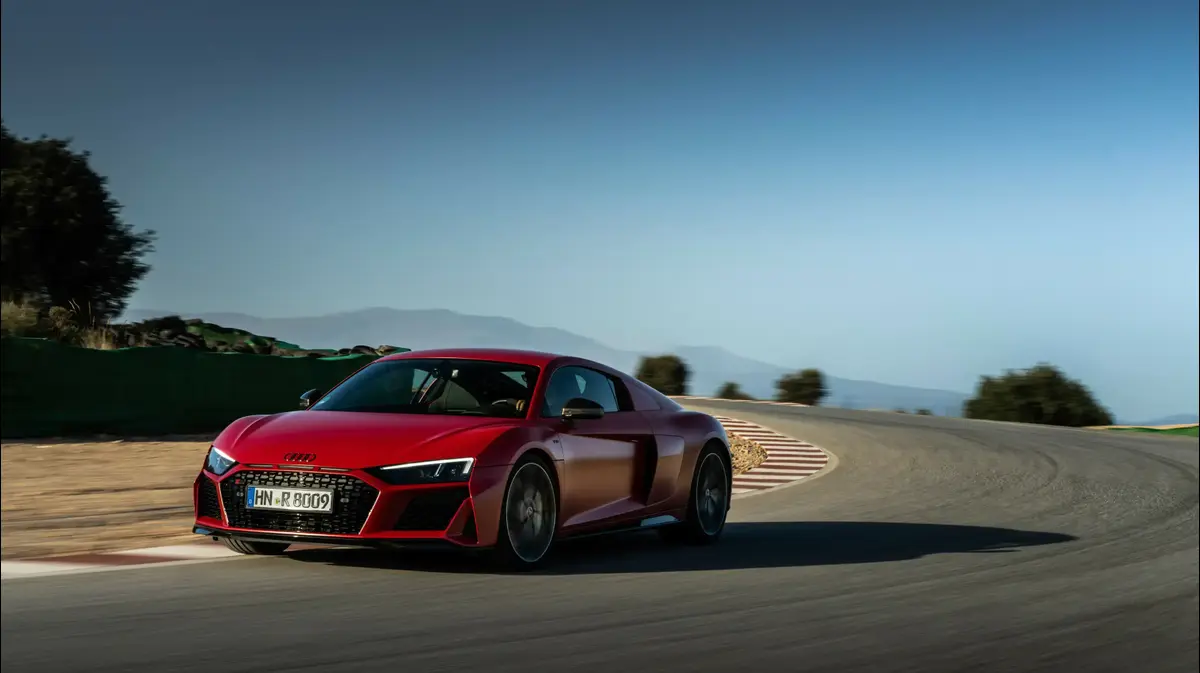Driving an Audi R8 GT (photo: Audi, editing: Nir Chen)
The headline from Europe reports that after pressure from the German automobile industry, the European Union softened the intention to ban the sale of vehicles with internal combustion engines in the EU countries after the year 2035. This move,
which is intended to help Europe meet the emission targets of pollutants as part of the fight against global warming, greatly stressed the Germans, whose industry The automobile industry is a major employer in their country, and one of the main export industries.
Although all the German car manufacturers already produce electric vehicles that are not bad at all, such as the Porsche Ticken, BMW i7, Audi Q8 Itron and Mercedes EQS, and although the Volkswagen Group leads the sales of electric vehicles in Europe, the loss of the possibility to sell internal combustion engines will not only result in dozens of layoffs Thousands of engineers and production workers who specialize in the field, but will also cause the Germans to lose a significant advantage in the automobile industry, their gasoline engines, which express experience and knowledge acquired in the almost 140 years since the invention of the automobile.
The European automobile industry already produces excellent electric cars, but is not ready to throw away 140 years of gasoline engine development (Photo: Keinan Cohen)
Following the pressures, the Union agreed to a compromise: after 2035 it will be possible to sell cars with internal combustion engines in Europe, but only those adapted to refuel with synthetic fuel.
It means fuel that was not produced from oil, but from hydrogen and carbon dioxide.
The process allows the creation of fuel from renewable materials, without the pollution produced by petroleum-based fuels.
The problem is that it is an energy-intensive process required to separate the hydrogen from the water, and to keep it clean it must be based on solar, wind or nuclear energy where it exists.
To convince the opponents, the new fuel received the catchy name e-Fuel, electronic fuel, even though it is not exactly electric powder, but fuel that is burned in an engine like gasoline, only in a much cleaner way thanks to the raw material and the production process.
The process is not free of emissions: Porsche claims it will reduce carbon dioxide emissions by 85%, but not to zero, although the production of electricity for the electric vehicle's batteries is also not always completely free of emissions, depending on the energy production system in each country.
Porsche has invested $32 million in a synthetic fuel production facility in Chile, Audi is developing synthetic gasoline and diesel, and Mazda is leading a similar effort on the part of the Japanese manufacturers.
More in Walla!
Pietro celebrates a round birthday and you enjoy a once-in-60-years sale
In collaboration with Pitro
Porsche is leading the effort to develop synthetic fuels (Photo: Rami Gilboa)
The main problem is that it is much more expensive to produce synthetic fuel than to extract oil and refine it.
Currently the price of synthetic fuel is about 3 euros per liter, 4 times the price of gasoline in Europe before tax.
According to estimates in the automotive and energy industries, accelerating industrial production of the clean fuel will lower costs, but even in 2035 they will not be at the price level of petroleum-based fuels.
Imagine that you arrive at a gas station and can only fill up with expensive 98 octane, at more than NIS 9 per liter, compared to NIS 6.81 for 95 octane?
The gap to the detriment of synthetic fuel will be even greater.
Since gasoline and diesel vehicles will continue to become more expensive due to the addition of systems for purifying the emission and its control, then next to the more expensive fuel, internal combustion cars will remain a pleasure for the rich.
Porsche has already announced that it will produce its legendary 911 sports car with such engines as long as it can legally do so, and perhaps the owners of one will be able to withstand the high gas prices.
But in the popular cars there will be no economic justification to produce them when they are adapted to synthetic fuel.
The day when electricity will replace gasoline is approaching, but it will not go without a fight (Photo: Nir Ben Tovim, Keinan Cohen)
Even in Europe, there are already fears of "adjustments" of engines that were officially designed to consume synthetic fuel in 2035 to consume gasoline from petroleum, which will still be sold for used cars, which will pass another 20 years from then until they leave the world in significant numbers.
When it comes mainly to software changes and adjusting the ignition program to each fuel, it is not impossible, and the Union has not yet decided how they will monitor this.
Of course, the decisions of the Union only bind its member states, while the regulation in the US and the rest of the world is different. But they also mark the way for the other countries, which are expected to adopt a similar policy at their own pace
. The last gasoline car we will have is getting closer.
vehicle
car news
Tags
Engine
electric car
fuel

